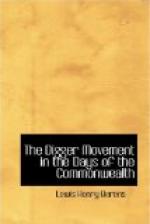FOOTNOTES:
[41:1] Both Gerrard and Winstanley are common names in that part of Lancashire which lies between Wigan and Liverpool. In the Wigan Parish Register there is an entry under the above date—“Gerrard Winstanlie, son of Edward Winstanlie.” The first pamphlet he wrote, The Mystery of God concerning the whole Creation, is dedicated “To my beloved countrymen of the County of Lancaster.” In his time the term “countrymen” had a more contracted meaning than now, and implied a common nativity of a Shire or Parish: indeed it still has this meaning in some parts of Cheshire.
[41:2] A Watchword to the City of London.
[43:1] Between the years 1644-1662 the works of the German mystic Jakob Boehme were translated into English. All Winstanley’s theological pamphlets were published in the year 1648-1649, to which year the origin of the Quaker doctrines is generally attributed.
[44:1] See The Mystery of God concerning the whole Creation, Mankind. British Museum, Press Mark, 4377, a. 1. The whole pamphlet consists of some 69 closely printed pages.
[44:2] Truth lifting up its Head above Scandals. British Museum, Press Mark, 4372, a.a. 17.
[45:1] The Saint’s Paradise. British Museum, Press Mark, E. 2137.
[45:2] Truth lifting up its Head above Scandals.
[46:1] Truth lifting up its Head above Scandals.
[46:2] The Saint’s Paradise.
[47:1] The Saint’s Paradise.
[47:2] “That which the people called Quakers lay down as a main fundamental in religion, is this, that God, through Christ, hath placed a principle in every man, to inform him of his duty, and to enable him to do it; and that those who live up to this principle, are the people of God; and that those who live in disobedience to it, are not God’s people, whatever name they bear, or profession they may make of religion.... By this principle they understand something that is Divine, and though in man, not of man, but of God; it came from Him and leads to Him all those who will be led by it ... it is the spirit given to every man to profit withal.”—William Penn, Primitive Christianity Revived (1696). Quoted from J. S. Rowntree’s The Society of Friends; its Faith and Practice.
[48:1] Speaking of the early Quakers, Cotton Mather, after attributing the origin of this sect “to some fanatics here in our town of Salem,” describes the principles of “the old Foxian Quakerism” as follows: “There is in every man a certain excusing and condemning principle, which indeed is nothing but some remainder of the Divine Image left by the compassion of God upon the conscience of man after his fall.... They scoffed at our imagined God beyond the stars.” He also contends that “the new turn such ingenuous men as Mr. Penn” had given to Quakerism, had made of it “quite a new thing.” See his History of New England, book vii. chap. iv.




